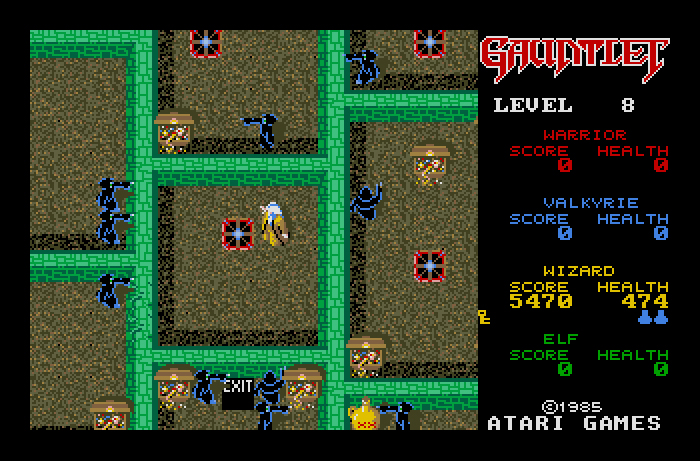Death
This one is a bit macabre, so watch out.
Death, as a concept, is one of those ideas that’s defined as being the absence of something. Struggling to comprehend it is a prevalent aspect of the human condition. Because of that, it’s an easy hook into the psyche of a vast majority of people. It’s a shortcut to psychological manipulation.
A brief, wholly biased history of death in video games is one of struggling to introduce a motivator/punishment for failure in the nascent genre of single player games. Instead of competing with another player, you were competing against the game itself in an asymmetric contest. Especially with the early single player games being pay-to-play arcade cabinets, there had to be some way to end the session with a note of finality. From that standpoint, it makes sense to use death to hit that note. “You died, next!”. If you were the owner of one of these games, that’s precisely the method to control play times and ensure a steady stream of income/players. “You got a boo-boo, you’re done!” doesn’t quite cut it for the motivator. “You’ve gotten a bit tired and decided to give up the whole quest/fight/dance” is just pathetic when we can so easily reach out and pluck that sensitive chord of Death.
Video games have gotten easier since then (The best part about writing for a blog is that you can make wildly unsubstantiated claims without absolutely no retribution!) . Perhaps in an effort to make games more fun and accessible, the finality of death has been greatly reduced. The idea of making people start from the beginning after making too many mistakes has drifted into the realm of the cruel and Dark Souls-esque when it was once the norm of gaming. As a result, death in video games no longer has any sense of finality to it, as more and more games are trending towards the idea of “keep trying from this last checkpoint until you get it”. Given that more lenient, fun-oriented games have taken over the market (Dark Souls experiences notwithstanding), games like “You Only Live Once” provide a unique experience. Go ahead. I’ll wait here until you go give a play. Come on back when you’re done.
Go on, it won’t take long.
…
Back?
Okay, so maybe calling it a “game” is a bit of an exaggeration. It’s more of a demonstrative art piece. If you haven’t already, try refreshing the game and loading it again. This is the only video game I can think of that has an actual, real end built in on death. There’s no redo, no try again, it’s real death. It’s also profoundly uncomfortable.
Our relationship to death is that of loss and finality, which can allow for easily inducing an emotional reaction in authors of all media. In video games, manipulation of our experience of death is now one of repetitious exposure and resolution of it. Respawn times, restarting from checkpoints, resuscitation, etc. all allow us to cheat death. This catharsis is a freeing experience, as it’s one of the great limitations I’ve talked about before. Outside the limited purview of video games, the manipulation of death is prevalent in all sorts of media and storytelling. So much of music is concerned with death and our coping of it. Likewise, consider how many times Superman has died. Or Barry Allen, Steve Rogers, etc. I’m sure Wolverine will be respawning in the next few years, after recently dying dramatically. These sorts of death/rebirth stories have become a tried-and-true trope in the comic world for exactly the same reason we see the proliferation of death in any media. It’s a troubling conclusion (especially when you push outside our pleasant, peaceful pastimes of video games, music and comic books and into things like current events and real news):
Death sells.
-Kendric



